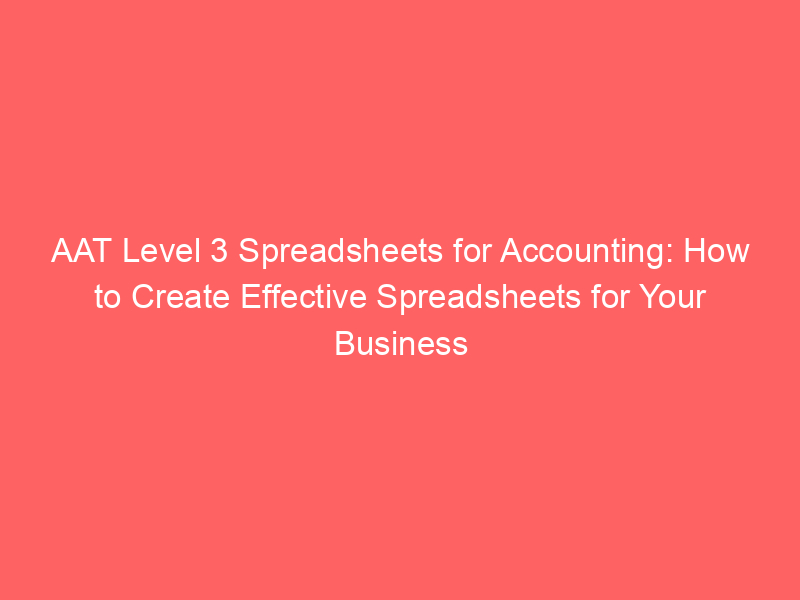If you are an accountant, or are considering a career in accounting, you may be wondering if AAT level 3 spreadsheets for accounting are worth your time. The answer is a resounding yes! AAT level 3 spreadsheets for accounting can help you create effective spreadsheets for your business. By taking the time to learn how to use spreadsheets effectively, you can save yourself a lot of time and money. Spreadsheets can be used for a variety of purposes, from tracking inventory to creating budget reports. By learning how to create effective spreadsheets, you can make your accounting process much easier and more efficient. If you are ready to learn more about AAT level 3 spreadsheets for accounting, read on for some tips on how to create effective spreadsheets for your business.
1. What are AAT level 3 spreadsheets for accounting?
If you’re a business owner, then you know that effective accounting is essential to keeping your business running smoothly. One important aspect of accounting is creating accurate and up-to-date spreadsheets. AAT level 3 spreadsheets are a great way to keep track of your business finances. They can be used to track income and expenses, create budgets, and track inventory. Creating effective spreadsheets can be a bit of a challenge, but with a little practice, you’ll be able to create spreadsheets that are both accurate and easy to understand. Here are a few tips for creating effective AAT level 3 spreadsheets for accounting: 1. Keep it simple – When creating a spreadsheet, it’s important to keep the design and layout simple. Avoid using too many colors or complex formulas. Stick to a basic layout that is easy to follow. 2. Use clear labels – Make sure that the labels you use on your spreadsheet are clear and easy to understand. Use abbreviations sparingly, and avoid using jargon that your audience might not be familiar with. 3. Use formulas wisely – Formulas can be very helpful in spreadsheet creation, but it’s important to use them wisely. Avoid using too many formulas, as this can make your spreadsheet difficult to understand. Use formulas only when absolutely necessary. 4. Proofread your work – Before you publish or share your spreadsheet, be sure to proofread it carefully. Check for errors in formulas, spelling mistakes, and incorrect data. By following these tips, you can create effective AAT level 3 spreadsheets for accounting that will help you track your business finances and make better decisions for your business.
2. How can AAT level 3 spreadsheets for accounting help you create effective spreadsheets for your business?
If you are running a business, then it is essential that you have a good understanding of accounting and financial reporting. This is where AAT level 3 spreadsheets for accounting can help you. By using these spreadsheets, you will be able to create effective spreadsheets for your business. The first thing that you need to do is to download the AAT level 3 spreadsheet template. This can be found on the internet or from the AAT website. Once you have downloaded the template, you need to open it in Microsoft Excel. Once you have the template open in Excel, you need to enter your business information into the various cells. This includes your business name, address, contact details and VAT number. You also need to enter your income and expenditure information. Once you have entered all of the required information, you need to save the spreadsheet. You can then use this spreadsheet to produce financial reports for your business. AAT level 3 spreadsheets for accounting can be a great help for businesses of all sizes. By using these spreadsheets, you will be able to create effective financial reports.
3. What are some tips for creating effective spreadsheets for your business?
As a business owner, you will often need to create spreadsheets to track various data points. Whether you are tracking sales data, customer data, or inventory levels, having an effective spreadsheet can help you make better decisions for your business. Here are some tips for creating effective spreadsheets for your business: 1. Keep it simple When creating a spreadsheet, it is important to keep it as simple as possible. This will help you avoid errors and ensure that your data is easy to understand. 2. Use formulas Formulas can be a great way to automate some of the calculations in your spreadsheet. This can save you time and ensure that your data is always accurate. 3. Use conditional formatting Conditional formatting can be used to highlight important data points in your spreadsheet. This can help you quickly identify trends or areas that need further analysis. 4. Use data validation Data validation can help you ensure that the data entered into your spreadsheet is accurate. This can help you avoid errors and ensure that your data is reliable. 5. Protect your data It is important to protect your data from unauthorized access. You can do this by password protecting your spreadsheet or using data encryption.
4. How can you use AAT level 3 spreadsheets for accounting to save time and money?
If you’re running a small business, then you know how important it is to keep on top of your finances. One way to do this is to use AAT level 3 spreadsheets for accounting. This can help you save time and money by creating effective spreadsheets that can be used to track your income and expenses. Here are some tips on how to create effective AAT level 3 spreadsheets for your business: 1. Keep it simple – don’t try to include too much information in your spreadsheet. Stick to the basics such as income and expenses. 2. Use formulas – this will help you save time by automatically calculating totals for you. 3. Use conditional formatting – this can help you highlight important information at a glance. 4. Use filters – this will help you focus on the information that you need to see. By following these tips, you can create effective AAT level 3 spreadsheets for your business that will save you time and money.
Thanks for reading! We hope you found this article helpful. If you have any further questions about AAT level 3 spreadsheets for accounting, feel free to contact us.







